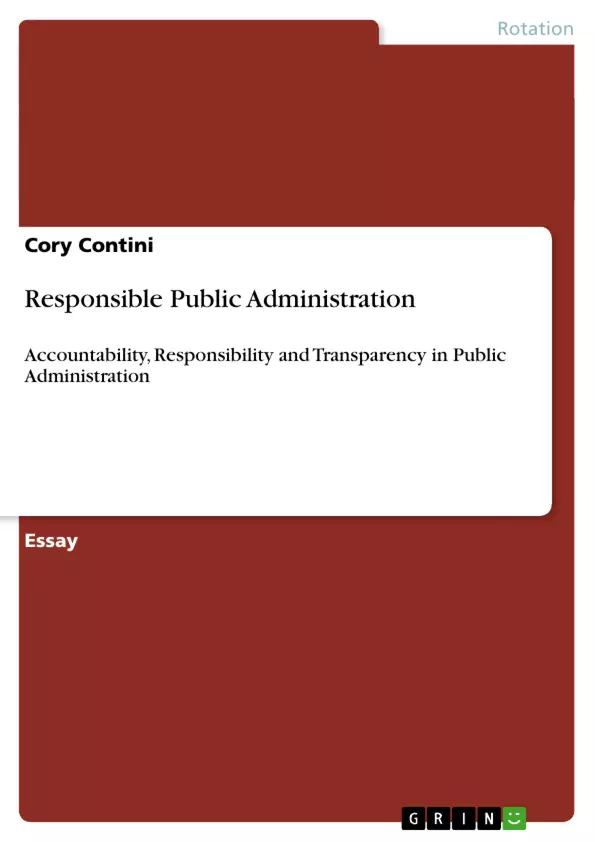Accountability is the essence of the democratic form of government. Accountability is the liability assumed by all those who exercise authority where there has been responsibilities delegated; ultimately, a liability owed to all citizens by the government and subsequently, every government department and agency. Since Canada is a representative democracy, it is responsible for good governance but accountable for its actions, whether or not the two coincide.
Inhaltsverzeichnis (Table of Contents)
- Accountability and Responsibility
- Accountability in the Public Sector
- Ministerial Responsibility
- Collective Ministerial Responsibility
- Individual Ministerial Responsibility
- Public Servant's Responsibility
- Regulating Bureaucratic Influence
Zielsetzung und Themenschwerpunkte (Objectives and Key Themes)
This text examines the concept of accountability within the Canadian political system. The author explores how the principle of accountability is exercised through parliamentary control, highlighting the roles and responsibilities of both elected officials and civil servants. The text also examines the different types of ministerial responsibility, including collective and individual accountability, and the challenges associated with ensuring accountability in a complex bureaucratic structure.- Accountability in a representative democracy
- Roles and responsibilities of elected officials and civil servants
- Collective and individual ministerial responsibility
- Challenges to accountability in a bureaucratic system
- Mechanisms to regulate bureaucratic influence
Zusammenfassung der Kapitel (Chapter Summaries)
- This chapter introduces the concept of accountability as a fundamental principle of democratic governance in Canada. It explains how accountability is exercised through parliamentary control and how citizens can hold their elected representatives responsible through the ballot box. The author also explores the relationship between accountability and responsibility within the Canadian political system.
- This chapter discusses accountability in the public sector from two perspectives: the civil servant and the cabinet minister. The author introduces the concept of managerial responsibility for civil servants and political responsibility for cabinet ministers. This chapter also explores the challenges of defining accountability and the importance of its role in Canadian public administration.
- This chapter focuses on the concept of ministerial responsibility, explaining how ministers are appointed to departments by the Prime Minister and are ultimately responsible for their departmental portfolios. It discusses the different types of ministerial responsibility, including collective and individual accountability. The author also explores the role of deputy ministers and senior civil servants in advising ministers and the importance of maintaining confidentiality within the government.
- This chapter delves into the concept of collective ministerial responsibility, highlighting its role in maintaining government stability and solidarity. It explains how the government must present a united front to parliament and how a vote of no confidence can lead to a government's resignation or dissolution. The chapter also discusses the importance of maintaining confidence in the government and the potential for opposition parties to utilize accountability measures to expose questionable government practices.
- This chapter explores individual ministerial responsibility, explaining how ministers are accountable to parliament for any wrongdoing within their departments, even if they are not directly involved. The author examines the challenges of holding ministers accountable for actions taken by their subordinates and discusses the potential for conflict between collective and individual ministerial responsibility.
- This chapter focuses on the accountability of public servants, highlighting the convention of protecting their anonymity to ensure political neutrality. The author explores the challenges of holding public servants accountable for their actions and discusses the mechanisms that the government utilizes to regulate bureaucratic influence, including legislative debates, question periods, central supervisory agencies, and legislative committees.
Schlüsselwörter (Keywords)
Accountability, Responsibility, Canadian Politics, Democracy, Parliament, Cabinet, Minister, Civil Servant, Collective Responsibility, Individual Responsibility, Bureaucracy, Public Sector, Governance, Political Neutrality.
Final del extracto de 9 páginas
- subir
- Citar trabajo
- Cory Contini (Autor), 2009, Responsible Public Administration, Múnich, GRIN Verlag, https://www.grin.com/document/230616
Leer eBook



